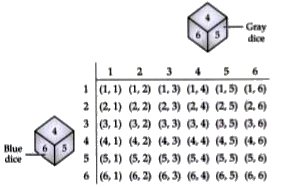Two dice are numbered 1,2,3,4,5,6 and 1,1,2,2,3,3, resepectively. They are thrown and the sum of the number is noted. Find the probability of getting each sum from 2 to 9, seperately.
Number of total outcomes =n(s)=36
(i) Let, E1 =Event of getting sum 2={(1,1),(1,)}
n(E1)=2
P(E1)=n(E1)n(S)=236=118
(ii) Let, E2=Event of getting sum 3= {(1,2),(1,2),(2,1),(2,1)}
n(E2)=4
P(E2)=n(E2)n(S)=436=19
Let E3=Event of getting sum 4={(2,2),(2,2),(3,1),(3,1),(1,3),(1,3)}
n(E3=4
P(E3)=n(E3)n(S)=636=16
(iv) Let E4=Event of getting sum 5={(2,3),(2,3),(4,1),(4,1),(3,2),(3,2)}
n(E4)=6
P(E4)=n(E4)n(S)=636=16
(v) Let E5=Event of getting sum 6 ={(3,3),(3,3),(4,2)(4,2),(5,1),(5,1)}
n(E5)=6
P(E5)=n(E5)n(S)=636=16
(vi) Let E6=Event of getting sum 7={(4,3),(4,3),(5,2),(5,2),(6,1),(6,1)}
n(E6)=6
P(E6)=n(E6)n(S)=636=16
(vii) Let E7= Event of getting sum 8={(5,3),(5,3),(6,2),(6,2)}
n(E7)=4
P(E7)=n(E7)n(S)=436=19
(viii) Let E8=Event of getting sum 9={(6,3),(6,3)}
n(E8)=2
P(E8)=n(E8)n(S)=236=118
Topper's Solved these Questions
- STATISTICS AND PROBABILITYBOOK - NCERT EXEMPLARCHAPTER - STATISTICS AND PROBABILITYEXERCISE - VERY SHORT ANSWERS QUESTIONS
2 Videos
- STATISTICS AND PROBABILITYBOOK - NCERT EXEMPLARCHAPTER - STATISTICS AND PROBABILITYEXERCISE - LONG ASWERS QUESTIONS
5 Videos
- REAL NUMBERSBOOK - NCERT EXEMPLARCHAPTER - REAL NUMBERSEXERCISE - Real Numbers
39 Videos
- SURFACE AREAS AND VOLUMESBOOK - NCERT EXEMPLARCHAPTER - SURFACE AREAS AND VOLUMESEXERCISE - Surface Areas And Volumes
62 Videos
Similar Questions
Two dice are numbered 1,2,3,4,5,6 and 1,1,2,2,3,3 respectively. They are thrown and the sum of the numbrees of them is noted. Find the probability of getting each sum from 2 to 9 separately.
View SolutionA dice is thrown twice and the sum of numbers apear to be 6. Find the probability of getting 4 on at least one throw.
View Solution
Knowledge Check
Two dice are thrown. If it is known that the sum of numbers on the dice was less than 6, the probability of getting a sum 3, is
A118B518C15D25Two dice are thrown, and numbers shown on each dice is noted. What is the probability that sum of number is 9?
A16B13C19D29Two dice are rolled simultaneously . Find the probability of
Getting the sum as a prime number .A35B512C12D34
Two dice are thrown at a time and the sum of the numbers on them is 6. The probability of getting the number 4 on any one of them is
View SolutionTwo dice are thrown. If it is know that the sum of numbers on the dice was less than 6, the probability of getting a sum 3 is
View Solution
Two dice, one blue and one grey are thrown at the same time.
Find the probability of getting an even number as the sum.
View SolutionTwo symmetrical dice are thrown. The probability of getting a sum of 6 points is
View SolutionThe sum of numbers on two throws of a dice is 8. Find the probability of getting 3 in at least one throw.
View Solution